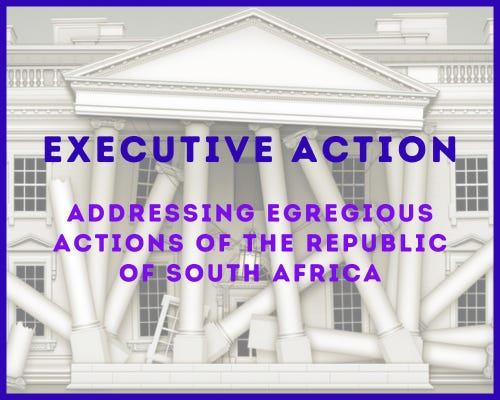Addressing Egregious Actions of the Republic of South Africa
Analysis of Trump’s Executive Order
Overview:
This executive order imposes punitive measures on the Republic of South Africa, citing concerns over its land reform policies, foreign policy decisions, and alleged racial discrimination against the Afrikaner minority. The order halts U.S. aid to South Africa, prioritizes resettlement of Afrikaner refugees in the United States, and criticizes South Africa’s international positions, particularly its legal actions against Israel and growing diplomatic ties with Iran. While the administration frames this as a defense of property rights and an effort to counter alleged human rights abuses, critics argue that the order misrepresents land reform efforts, selectively applies humanitarian policies, and risks damaging U.S.-Africa relations.
Detailed Analysis:
Halting U.S. Foreign Aid to South Africa:
Policy: Directs all U.S. executive departments, including the United States Agency for International Development (USAID), to cease financial assistance and aid to South Africa, with limited discretionary exceptions.
Progressive Concern:
Harm to Development Programs: The cessation of aid could undermine critical health, education, and economic initiatives that benefit millions of disadvantaged South Africans.
Geopolitical Isolation: This action may push South Africa closer to nations like China and Russia, weakening U.S. diplomatic influence in Africa.
Misrepresentation of Land Reform Efforts: The order frames South Africa’s Expropriation Act as discriminatory against Afrikaners while disregarding historical land dispossession under apartheid and ongoing efforts to redress economic inequalities.
Prioritization of Afrikaner Refugee Resettlement:
Policy: Instructs the Secretary of State and the Secretary of Homeland Security to prioritize humanitarian relief and refugee status for Afrikaners in South Africa who claim to face racial discrimination.
Progressive Concern:
Selective Application of Humanitarian Policy: Prioritizing white Afrikaners over other persecuted groups contradicts established refugee policies that prioritize need and vulnerability, not race or ethnicity.
Risk of Racial Bias: The order’s focus on a historically privileged group could reinforce narratives of preferential treatment for white refugees while ignoring marginalized communities facing more severe persecution worldwide.
Politicization of Immigration Policy: Prioritizing Afrikaners for resettlement may set a precedent where refugee admissions are based on political considerations rather than humanitarian need.
Criticism of South Africa’s Foreign Policy Stances:
Policy: Condemns South Africa’s legal actions against Israel at the International Court of Justice (ICJ) and its diplomatic ties with Iran, stating these positions undermine U.S. foreign policy interests.
Progressive Concern:
Violation of Sovereign Rights: South Africa, like any nation, has the right to determine its own foreign policy. U.S. intervention in these matters could be seen as coercive and hypocritical.
Potential Backlash from Global Partners: Many countries support South Africa’s positions on Israel and Iran. Condemning these actions may strain U.S. relationships with allies in Africa, Latin America, and Europe.
Risk of Increased Geopolitical Polarization: By publicly denouncing South Africa’s diplomatic decisions, the U.S. may push the country further into alliances with nations opposed to American foreign policy.
Historical Context:
South Africa’s Land Reform Efforts: Land dispossession was a central pillar of apartheid, leaving the majority of Black South Africans without land ownership. The post-apartheid government has pursued land reform policies to redress these injustices, though progress has been slow.
U.S.-South Africa Relations: The U.S. has historically engaged with South Africa as a strategic partner in Africa. However, tensions have risen over South Africa’s independent foreign policy stances, particularly on Israel, Palestine, and BRICS economic cooperation.
Past U.S. Sanctions on South Africa: During apartheid, the U.S. imposed economic sanctions to pressure the government to dismantle racial segregation. This order reverses that historical precedent by penalizing South Africa for policies intended to rectify racial inequalities.
Broader Implications:
Risk of Diplomatic Fallout: The order may weaken U.S.-Africa relations and alienate other African nations that view land reform as a legitimate means of economic justice.
Precedent for Politicized Humanitarianism: If refugee resettlement is prioritized based on race or political alignment rather than vulnerability, it may erode trust in the U.S. immigration system.
Impact on U.S. Influence in Africa: By withdrawing aid and adopting an aggressive stance, the U.S. risks losing diplomatic leverage in South Africa and across the continent.
Social Media Posts:
Post 1: Halting U.S. aid to South Africa won’t help its people—it will hurt vulnerable communities. Land reform is complex, but cutting support punishes those in need. Read more: https://www.whitehouse.gov/presidential-actions/2025/02/addressing-egregious-actions-of-the-republic-of-south-africa/ #LandJustice #AfricaPolicy #HumanRights
Post 2: Why prioritize white Afrikaners for refugee status while ignoring persecuted communities worldwide? U.S. immigration policy should be based on need, not race. #RefugeeRights #EqualProtection #HumanitarianJustice
Post 3: South Africa has the right to determine its foreign policy without U.S. interference. Sanctioning a sovereign nation for its diplomatic choices sets a dangerous precedent. #RespectSovereignty #GlobalDiplomacy #ForeignPolicyMatters

